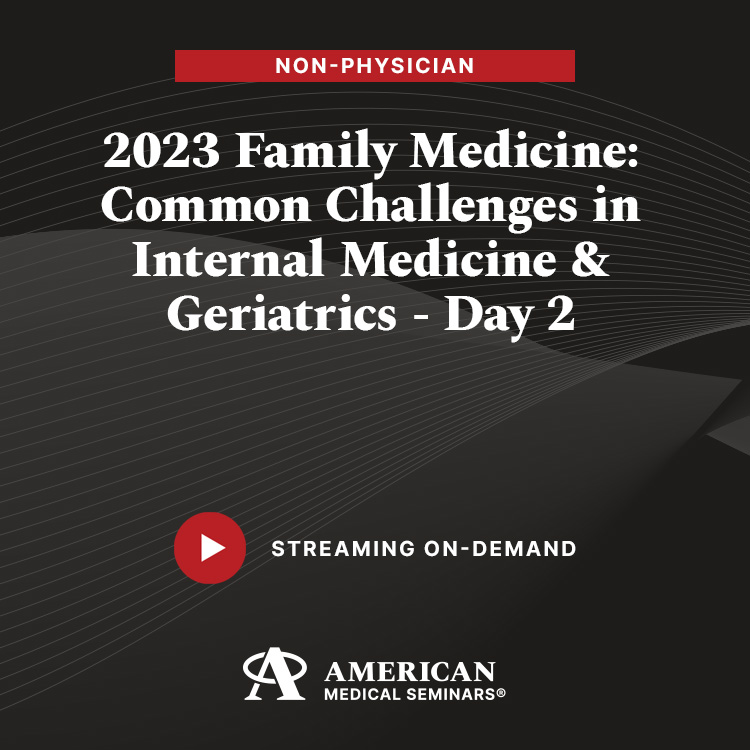Title: 2023 Family Medicine: Common Challenges in Internal Medicine & Geriatrics – Day 2 (Non-Physician)
Faculty: Michael A. Malone, M.D.; Gary H. Oberlender, M.D., F.A.C.P; David A. Horowitz, M.D.
Release Date: 7/1/2023 Expiration Date: 7/1/2026
Day 2
Advanced Nutritional Assessment and Therapy (Oberlender)
Upon completion of this session, the participant should be able to: EBM, COMP
- Integrate readily available clinical data to make accurate nutritional assessments in seniors.
- Relate metabolic changes in aging to assess risk for malnutrition.
- Apply an evidence based approach to treatment of undernutrition in seniors.
Vitamin B-12 and Vitamin D in Seniors (Oberlender)
Upon completion of this session, the participant should be able to: EBM, COMP
- Integrate the normal physiology of Vitamins B-12 and D.
- Differentiate the pathologic syndromes associated with B-12 and D deficiency.
- Develop an evidence based evaluation of B-12 and D deficiency for seniors.
- Develop an evidence based approach to treatment options for B-12 and D in seniors.
Headaches Disorders (Malone)
Upon completion of this session, using the International Headache Society and U.S. Headache Consortium Guidelines and the National Guideline Clearinghouse and the evidence-based reports from Clinical Evidence, the participant should be able to: EBM, GL, COMP
- Construct the approach for evaluating a patient with possible migraine headaches.
- Assess the advantages of supportive therapy and lifestyle changes in treating migraine headaches compared to pharmacologic therapy.
- Appraise the pharmacologic options for treating the acute pain of a migraine headache.
- Recommend a prophylactic therapy regimen for patients with recurrent migraine headaches.
Irritable Bowel Syndrome (Malone)
Upon completion of this session, the participant should be able to: EBM, COMP
- Appraise possible etiologies for Irritable Bowel Syndrome.
- Select and utilize diagnostic criteria to identify IBS, based on the current medical evidence and expert recommendations.
- Use the current medical literature to assess and screen for other conditions that can present with similar IBS symptoms.
- Detect “red flag” signs and symptoms that should make one question the diagnosis of IBS.
- Formulate an EBM diagnostic evaluation for patients with signs and symptoms of IBS.
- Use the current medical literature to develop an EBM treatment plan for Irritable Bowel Syndrome.
Dyspepsia (Malone)
Upon completion of this session, the participant should be able to: EBM, COMP
- Appraise symptoms and common etiologies for dyspepsia.
- Use EBM to detect “alarm symptoms” that are suspicious for GI malignancy.
- Apply current medical evidence and expert guidelines to construct a diagnostic evaluation for Dyspepsia.
- Determine appropriate treatment for Dyspepsia based on current medical evidence and the likely etiology.
- The receipt for any incentive-associated purchase will designate the value of the gift card separately from the cost of the learning activity.
- This incentive may have implications on your tax reporting obligations. Any reimbursed amount must be declared as personal income for tax purposes.

